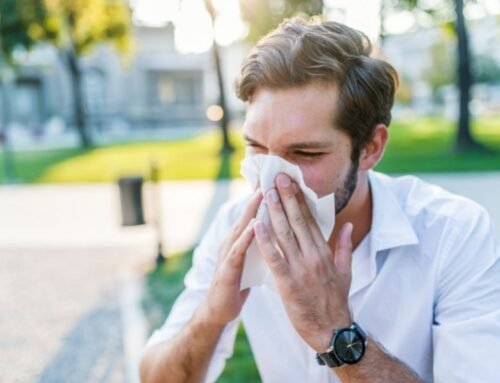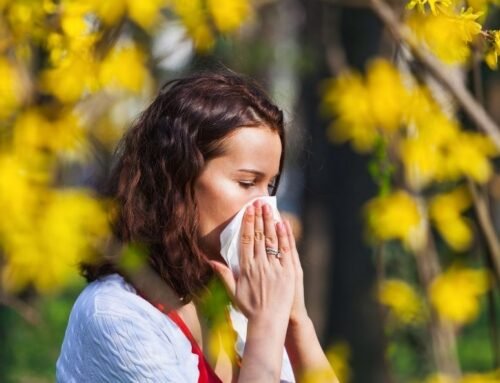Allergic diseases, whose number is increasing day by day, have become an international health problem in terms of causing significant problems and socioeconomic expenses. Allergic diseases are increasing with the change in environmental conditions. Every day, we encounter people with allergic complaints in our immediate environment. The diagnosis and treatment of allergic diseases that can occur in any period of our lives from birth is extremely important. Adult allergists are specially trained experts in diagnosis and treatment methods.
Allergic diseases can cause serious health problems and negatively affect the social life of people. Apart from allergic reactions, food and drug allergies can lead to serious consequences that can lead to death, while some of the allergic diseases may progress slowly and lead to more serious problems in the future.For example, urticarial complaints that manifest themselves, itching, redness and swelling on the skin may be a sign of future allergic shock.
Allergic diseases that occur in the later years of our lives often turn into bigger problems for the patient if they are not treated. An adult allergy specialist is needed for the correct diagnosis and correct treatment of allergic diseases in adults. If you haven’t found a solution for the allergic disease that occurs in adulthood, you may have gone to the wrong place.
Today, many adults seek a doctor for treatment due to severe uncontrolled asthma, allergic rhinitis, allergic cough, bee, medicine, and food allergy. In addition, people with allergies are either unaware or know little about the treatment of this disease as an adult allergist.
How is Adult Allergy Specialist Education?
Adult allergists graduate as general practitioners after 6 years of education after entering the medical school. They are expected to fulfill their service obligations to the state. (300-600 days) Only after that they receive their diplomas. It is not over yet, of course, they can work as a specialist after a 5-year assistantship training by taking the medical specialty examination, which is held twice every year in April and September, and choosing one of their specialties. To become a physician, it is sufficient to gain medical school, be successful in medical specialty examination and get your expertise. However, in order to become an allergic diseases specialist, they must complete their state service obligations after taking the sub-branch exam other than internal diseases major, and after gaining training and expertise in the diagnosis and treatment of allergic diseases for 3 years.
In short, the answer to the question of which physicians are allergic diseases specialists are experts who are internal diseases specialists and who have been trained in the allergy department, which is a sub-branch above the main branch of internal medicine, for 3 years after passing the allergy higher specialization exam. Adult Allergic Diseases Specialists deal with the diagnosis, treatment and follow-up of allergic problems seen in adults over the age of 18.
Which Diseases Adult Allergy Specialists Have Been Trained for Diagnosis and Treatment?
Allergic diseases can occur at any age, although some allergic diseases are more common in childhood, they can also occur in adulthood and sometimes cause very serious health problems.
Allergic problems in adults are as follows:
- Asthma
- Allergic Flu (house dust, pollen, animal hair, mold allergy)
- Chronic cough
- Eczema (Atopic Dermatitis)
- Urticaria (Cold urticaria, Late pressure urticaria, Solar urticaria, Hot urticaria, Vibration urticaria, Cholinergic urticaria, Aquagenic urticaria, Contact urticaria or dermographism) and Angioedema
- Contact dermatitis, Contact allergy
- Eye Allergy
- Food Allergy
- Drug Allergies
- Insect Allergies (Bee Allergy)
- Latex allergy
- Occupational Allergies
- Anaphylaxis (Allergic Shock)
- Hereditary Angioedema
Specialists trained in the diagnosis and treatment of all of the above diseases are called adult allergy specialists.
Why are adult allergists important?
Adult allergy specialists should be fully trained in other diseases, except allergic diseases. For example, there may be many diseases that occur on the skin surface, which we call chronic urticaria, that range from a few millimeters to a few centimeters in size, often pale in the middle, itchy plaques or skin rashes that last longer than 6 weeks. Especially causes such as autoimmune diseases, infections or malignancies should be investigated carefully.
Allergic diseases can occur with complaints that concern many specialties, so different clinics are trying to be treated. It should be evaluated as a whole in allergic diseases like other diseases. Treatment may need to be directed by adult allergy specialists, if necessary, by obtaining information from other specialties. It is extremely important for the patient to refer to the relevant clinic after the diagnosis of other diseases underlying allergic diseases or to reveal the underlying allergies of the patients who are followed up with different diagnoses. For example, it is important to determine that the patient who is frequently operated due to nasal polyps has house dust allergy or that the patient who is followed-up for urticaria has complaints due to Hashimoto thyroiditis.
Thanks to adult allergists, it may not be necessary to visit many specialists. Allergic diseases often tend to coexist. An adult patient with asthma also has symptoms such as allergic rhinitis or hay fever eczema. Therefore, there is no need to go to a pulmonologist for asthma, an otolaryngologist for allergic rhinitis, or a dermatologist for eczema. As it is known in adults, nasal discharge starts with itching, congestion and sneezing, allergic rhinitis or hay fever later turns into asthma with complaints such as cough and shortness of breath. Adult allergists are the most experienced experts in urticaria, eczema and asthma.
As a result;
Allergic diseases that occur in the later years of our lives often turn into bigger problems for the patient if they are not treated. An adult allergy specialist is needed for the correct diagnosis and correct treatment of allergic diseases in adults.
Adult allergic diseases specialists are specialists who are internal diseases specialists and who have been trained in the allergy department, which is a minor branch above the internal medicine major, for 3 years after passing the allergy higher specialization exam.
Adult allergists are experts who diagnose and treat allergic diseases such as asthma, allergic rhinitis (hay fever), eczema, food allergies, drug allergies, insect allergies (bee allergies), contact dermatitis, latex allergies, urticaria and angioneurotic edema.
Adult Allergic Diseases Specialists deal with the diagnosis and treatment of allergic problems in adults over the age of 18.






